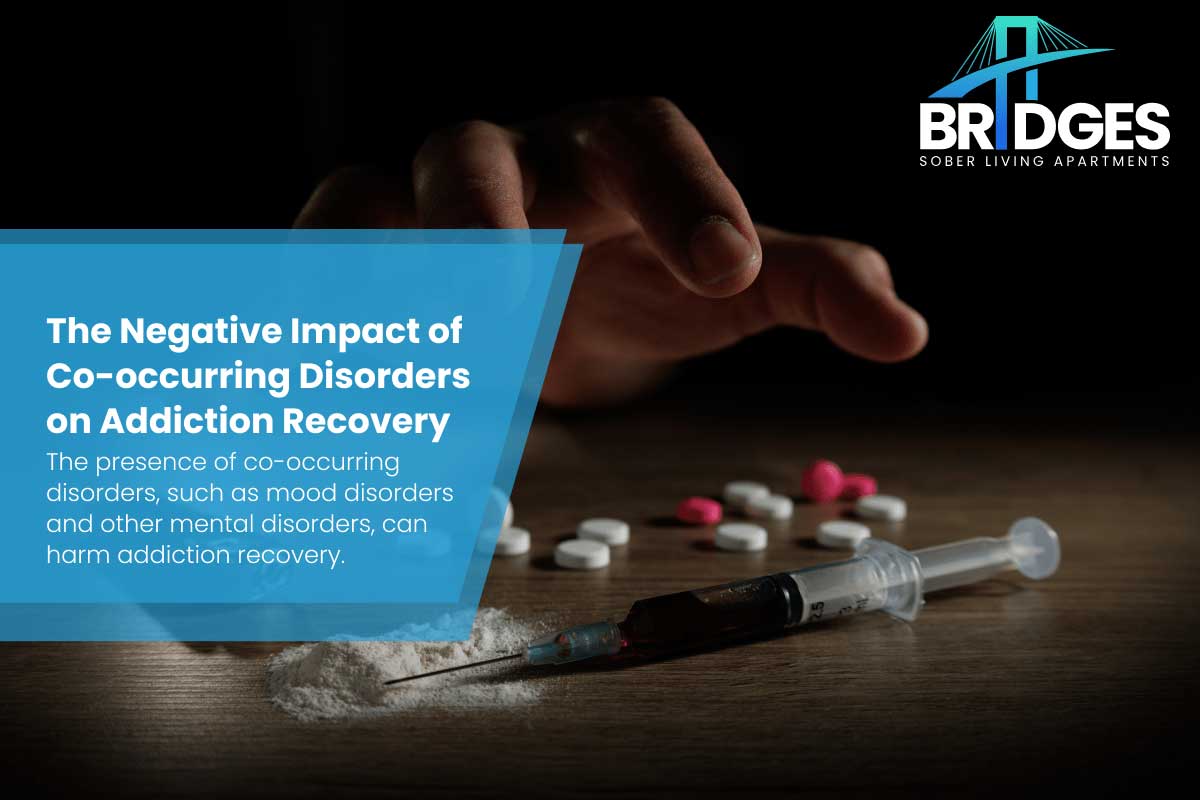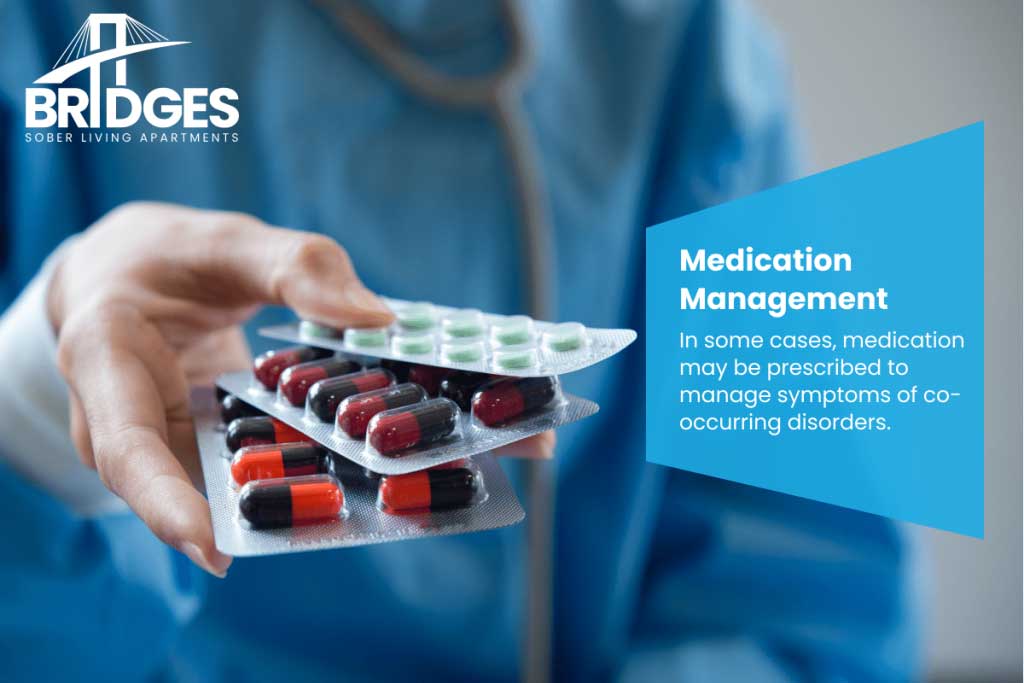Co-occurring disorders refer to the simultaneous presence of a mental health disorder and a substance use disorder.
It is common for individuals struggling with addiction to also experience mental health challenges, such as depression, anxiety, or post-traumatic stress disorder (PTSD). Ignoring these co-occurring disorders can hinder the recovery process and increase the risk of relapse.
Co-occurring disorders, also known as dual diagnosis, are recognized and classified by the Diagnostic and Statistical Manual of Mental Disorders (DSM).
The DSM establishes criteria for diagnosing various mental health disorders and substance use disorders. When both conditions are present and interact, affecting each other’s symptoms and complicating the treatment process, they are referred to as co-occurring disorders.
According to the Substance Abuse and Mental Health Services Administration (SAMHSA), nearly 9.2 million adults in the United States alone have a co-occurring disorder. That’s a significant number of people simultaneously experiencing the complexities of addiction and mental illness. This substantial number highlights the need for integrated treatment that addresses both conditions simultaneously.
Co-morbid disorders refer to the presence of two separate conditions, such as mental health issues and substance abuse, without necessarily influencing each other. Co-occurring disorders, on the other hand, involve a mutual relationship where the presence of one condition impacts the other, such as mental health issues worsening substance abuse or vice versa.
One common example is the co-occurrence of alcohol abuse or drug addiction with mental disorders such as depression or anxiety. Individuals with depression may turn to alcohol or drugs as a way to cope with their symptoms, leading to a dual diagnosis.
Similarly, individuals with anxiety disorders may self-medicate with substances to alleviate their anxiety. The combination of substance abuse and co-occurring mental disorders can create complex challenges that require a comprehensive treatment approach to address both conditions effectively.
The symptoms of co-occurring disorders can vary depending on the specific mental health issue and substance abuse involved. Common symptoms include:
Several factors can contribute to the development of co-occurring disorders. Genetics, environment, and lifestyle choices all influence their onset.
Genetic factors can predispose individuals to both addiction and mental health disorders. Certain genes may make some people susceptible to developing these conditions when exposed to specific environmental triggers.
Environmental factors, such as childhood trauma, chronic stress, or exposure to substance abuse, can significantly influence the development of co-occurring disorders. Adverse experiences can increase the risk of both addiction and mental health challenges.
Certain lifestyle choices, including substance abuse, can contribute to the development of co-occurring disorders. Substance use can worsen existing mental health conditions or even trigger new ones.
Underlying conditions such as mental illness, trauma, and chronic stress are significant risk factors for co-occurring disorders. Individuals who have experienced trauma or chronic stress are more vulnerable to developing both mental health challenges and substance use disorders.
Traumatic experiences can lead to symptoms of post-traumatic stress disorder (PTSD) and increase the likelihood of turning to substances as a coping mechanism. Chronic stress can also contribute to the onset of mental illnesses such as depression and anxiety.
The presence of co-occurring disorders, such as mood disorders and other mental disorders, can harm addiction recovery. The complex interaction between these conditions can intensify symptoms and complicate recovery. Individuals with co-occurring disorders often face increased challenges in managing their substance abuse, as the symptoms of their mental disorders may trigger or worsen cravings and withdrawal symptoms.

Individuals with co-occurring disorders face a higher risk of relapse than those without mental health challenges. The interaction between addiction and mental illness can make it difficult to maintain sobriety, as the symptoms of one disorder may trigger or worsen the symptoms of the other.
Co-occurring disorders can make it harder for individuals to engage in and remain committed to addiction treatment. The interplay of symptoms may lead to frustration, hopelessness, and a lack of motivation to seek help or continue with treatment.
Recognizing the presence of co-occurring disorders is essential for effective treatment. Let’s explore how to identify these conditions in yourself or your loved ones.
Several mental health disorders commonly co-occur with addiction. Some of the most prevalent ones include:
Depression– Persistent feelings of sadness, loss of interest in activities, changes in appetite or sleep patterns, and difficulty concentrating are common symptoms of depression.
Anxiety– Intense and excessive worry, panic attacks, restlessness, and physical symptoms such as increased heart rate or sweating are indicative of an anxiety disorder.
Bipolar disorder– Characterized by extreme mood swings, from periods of manic energy and euphoria to episodes of deep depression.
Post-traumatic Stress Disorder (PTSD)– Often triggered by experiencing or witnessing a traumatic event, PTSD can lead to flashbacks, nightmares, and severe anxiety.
If you suspect that a friend or family member may be struggling with co-occurring disorders, remember to approach the situation with empathy and support. Encourage open and honest communication, and be ready to listen without judgment. Offer to help them find professional support and accompany them to appointments if needed.
A professional assessment and diagnosis by a qualified healthcare provider or mental health professional are essential for accurately identifying co-occurring disorders. These professionals have the expertise and knowledge to evaluate symptoms, conduct comprehensive assessments, and develop personalized treatment plans.
Effective treatment for co-occurring disorders requires an integrated approach that addresses both the addiction and the mental health disorder simultaneously.
Integrated treatment involves coordinating care between mental health and substance abuse professionals to provide comprehensive and personalized support. It aims to treat both conditions concurrently, recognizing their relationship and tailoring treatment plans to address individual needs.
Cognitive-Behavioral Therapy (CBT)– CBT helps people identify and change negative thoughts and behaviors. It promotes healthier coping strategies and leads to more positive outcomes.
Dialectical Behavior Therapy (DBT)– DBT focuses on teaching individuals skills to manage intense emotions, improve relationships, and develop mindfulness techniques.
Group Therapy– Group therapy provides a supportive and understanding environment where individuals can share their experiences, gain insights, and learn from others facing similar challenges.
Family Therapy– Involving family members in therapy can foster understanding, improve communication, and strengthen support systems.
In some cases, medication may be prescribed to manage symptoms of co-occurring disorders. Medications can help stabilize mood, reduce anxiety, and alleviate withdrawal symptoms.

However, medication should always be used under the guidance and supervision of a qualified healthcare professional.
Holistic and alternative treatments for co-occurring disorders encompass meditation and mindfulness practices, promoting self-awareness and emotional regulation. Moreover, yoga enhances physical and mental well-being through postures, breathing exercises, and meditation. Art therapy also aids expression and healing, allowing individuals to explore emotions and experiences creatively, fostering therapeutic growth.
Self-care is a vital part of maintaining both mental health and sobriety during recovery. Taking time to nurture your mind, body, and spirit helps build resilience, reduce stress, and prevent relapse.
Improved outcomes are often observed when co-occurring disorders are effectively addressed in addiction recovery. A systematic review found that integrated treatment for dual-diagnosis disorders consistently produced superior outcomes compared to treatment of individual disorders with separate treatment plans
Another systematic review found that integrated treatment held an advantage over non-integrated treatment in significantly improving psychiatric symptoms in individuals with dual-diagnosis disorders.
These statistics suggest that integrated treatment for co-occurring disorders leads to improved outcomes. By addressing both substance use disorder and mental illness concurrently, individuals have a better chance of achieving positive outcomes in their recovery.
Addressing co-occurring disorders and addiction requires a comprehensive approach that recognizes the relationship between mental health and substance abuse. Common co-occurring disorders include other mental illnesses such as depression, anxiety, and personality disorders. Individuals struggling with these conditions often turn to drug use as a means of self-medication or to cope with their symptoms. It is important to note that co-occurring disorders can coexist with medical illnesses, further complicating the treatment process.
An integrated treatment program is key to effectively addressing co-occurring disorders and addiction. This approach combines therapies tailored to individual needs, including cognitive-behavioral therapy (CBT) and dialectical behavior therapy (DBT). These interventions help individuals develop healthy coping mechanisms, manage risky behaviors, and improve overall well-being.
Support groups also play a vital role in the recovery process. They provide a sense of community and understanding, allowing individuals to share experiences, gain insights, and receive ongoing support.
It is important to remember that addressing co-occurring disorders and addiction is a journey that requires ongoing commitment and support. With the right treatment, support, and determination, individuals can achieve lasting recovery and improve their overall quality of life.
To individuals and families affected by addiction and co-occurring disorders, know that you are stronger than you realize. The path to recovery may seem daunting, but reaching out for help is a courageous and transformative step. Remember, you don’t have to face this journey alone. A network of support is waiting to guide you toward healing and lasting wellness. Reach out to the available resources, professionals, and support networks.
Discover the transformative power of sober living and take control of your recovery journey. Sober living provides a supportive and structured environment where you can heal, build essential life skills, and foster lasting sobriety. Embrace the opportunity to surround yourself with like-minded individuals, access vital resources, and create a solid foundation for a fulfilling, substance-free life. Take the courageous step towards a brighter future and explore Bridges Sober Living Apartments today. Please contact us today at our contact page or call us at 310-953-4075 for additional information about our sober living home.
Substance Abuse and Mental Health Services Administration. 2023, March 22. Co-Occurring Disorders and Other Health Conditions. https://www.samhsa.gov/medications-substance-use-disorders/medications-counseling-related-conditions/co-occurring-disorders#:~:text=People%20with%20mental%20illness%20are,have%20a%20co%2Doccurring%20disorder.
Kelly, T. M., & Daley, D. C. (2013). Integrated treatment of substance use and psychiatric disorders. Social work in public health, 28(3-4), 388–406. https://doi.org/10.1080/19371918.2013.774673
Chetty, A., Guse, T., & Malema, M. (2023). Integrated vs non-integrated treatment outcomes in dual diagnosis disorders: A systematic review. Health SA = SA Gesondheid, 28, 2094. https://doi.org/10.4102/hsag.v28i0.2094